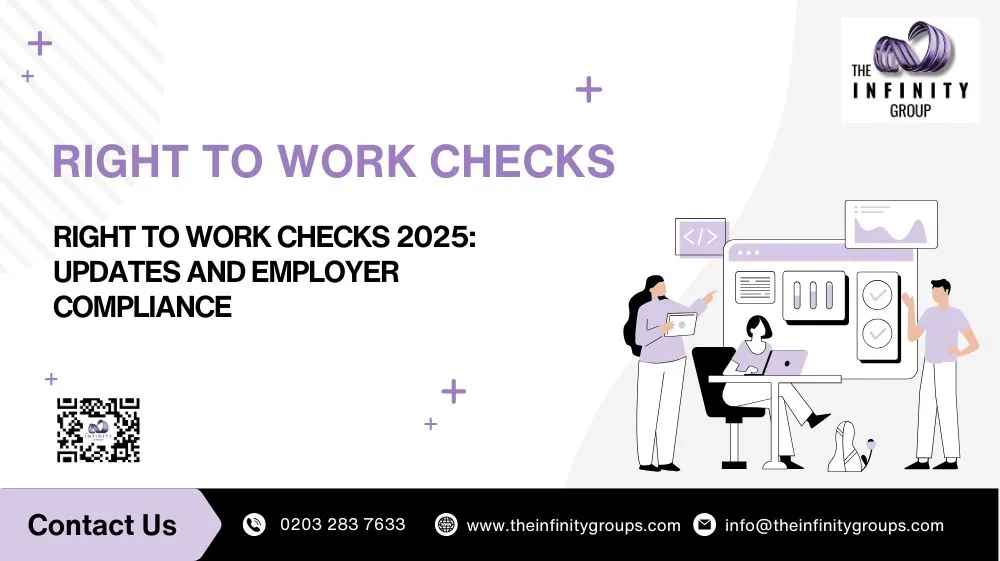The UK government will introduce significant updates in 2025 to the right-to-work checks. These updates are aligned with digital transformation and include stricter compliance measures. Employers need to be informed in order to avoid civil penalties and ensure compliance with the law. This document details the main changes, employer responsibilities and legal consequences.
Updates to 2025
1. Decommissioning Biometric Cards
Biometric Residence Permits and Biometric Resident Cards (BRC) no longer serve as valid proof of the right to work. People who used to rely on physical immigration documents will need to create a UKVI Account in order to access their E-Visa. This will be their new method of right-to-work confirmation. Employers are required to use the Home Office’s online checking service in place of physical BRPs/BRCs.
2. Criminal Liability & Increased Civil Penalties
Civil penalties of up to £60,000 for each violation can be imposed if the right-to-work check is not conducted properly. Employers may also be subject to criminal liability for hiring individuals who are not legally entitled to work in the UK
3. Sponsor License Holders
Businesses that hold a sponsor license are required to exercise greater diligence. Non-compliance could result in penalties such as:
- License suspension or cancellation
- Future restrictions on the hiring of foreign workers
- Significant operational disruptions
4. Visa Expiry Checks and Follow-Up Checks
Before an employee’s permission to work expires, employers must perform a follow-up check. It is important to do this in order to keep the statutory exemption from liability for hiring an illegal worker. In 2025, the grace period for verifying visa expiry has been reduced significantly. This makes timely follow-ups crucial for compliance.
5. Statutory Defence & Legal Protection
Employers are protected from liability if they comply with the Prevention of Illegal Working Legislation. A statutory defense is only available when the employer performs the right-to-work check before employment begins.
6. Acceptable documents for manual checks
Manual checks of right-to-work are still allowed but for British and Irish citizens. Acceptable documents are a valid British passport, an Irish passport, or a combination that proves the individual’s right to work in the UK. The Home Office’s latest guidance must be followed by employers when conducting these checks.
7. The Ukraine Permission Extension Scheme
The Ukraine Permission Extension Scheme will officially open on February 4, 2025. This scheme allows Ukrainian nationals who qualify to extend their stay in the UK. Employers should be aware of the scheme and conduct checks on employees’ right to work in accordance with it.
8. Remove COVID-19 Temporary Adapted Checks
Has withdrawn all temporary adjustments made to the right-to-work checks during the COVID-19 Pandemic. Employers are now required to follow the standard procedures for right-to-work verification, including document checks in person where applicable.
Expert Compliance & Workforce Solutions
The Infinity Group helps businesses comply with the right-to-work laws, employer obligations and sponsor license requirements. Our expert guidance will help you navigate Home Office regulations efficiently, avoid penalties and maintain a legally secure workforce.
FAQs
Employers can still manually check the right-to-work documents.
Only British and Irish citizens are allowed to undergo manual checks. All other workers are required to be verified by the Home Office Online System.
What are the penalties if you fail to pass a right-to-work check?
Non-compliance with the law can lead to:
- Civil penalties of up to £60,000 for each violation
- Sponsor license suspension or revocation
- Criminal Liability: If you knowingly hire illegal workers
How does the Home Office Online Checking System work?
Employers can verify the employee’s work status by using a code generated via the Home Office site.
What should an employer do when a visa expires?
Employers must conduct follow-up checks on the right to work before an employee’s current authorization to work expires. It is important to do this in order to keep the statutory exemption from liability for hiring an illegal worker.
Do remote workers require right-to-work verification?
Yes. All employees who work for UK-based companies must go through a right-to-work check before beginning employment, regardless of their location.

